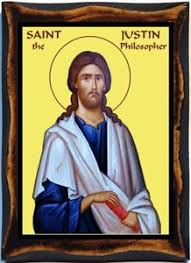HOMILY WEEK 09 02 – Year I
Giving Ourselves Back to God:
Memorial of St. Justin Martyr
(Tob 2:9-14, 3:1; Ps 112; Mk 12:13-17)
***************************************
Christine Archibald, the Canadian victim of a terrorist attack in London, had a heart for the poor and worked at a homeless shelter. The hashtag #ChrissySentMe inspired people around the globe to do an act of kindness to the homeless in her name.
The gospel today invites us to act in a similar fashion – to give to God what is God’s, and to give ourselves to others in selfless service. Our hashtag could be #HereIAmToDoYourWill.
The Jewish leaders in the gospel try to trick Jesus and trap him in a dilemma about paying taxes to the emperor. Should they pay or should they resist? They were trying to force Jesus to either anger the crowds, or antagonize the Romans.
Instead, Jesus turns the tables on them, bypassing the financial question of taxes completely, and focusing their attention on the image on the coin. That image was of the emperor Caesar, so Jesus replied simply, “Give to Caesar what is Caesar’s, and to God what is God’s.
But what does giving to God what is God’s mean? Who gives what to God and how? The book of Genesis clearly states that we are made in the image and likeness of God, and so Jesus is implying that we are to give ourselves back to God.
The Jewish leaders knew this passage well. They were amazed at how cleverly Jesus had turned the tables on them. He was not trying to silence them or even win an argument – he was just trying to remind them that they belong to God, and should pay them selves back to God. And so should we.
What does that mean? How to I “repay myself” back to God? Perhaps like the movie, “Paying It Forward.” St. Mother Theresa of Calcutta had it right, “What you would like to do to Jesus, whom you cannot see, do to the person next to you whom you can see, and you will be doing it to Jesus.”
Doing God’s will is to love others as we love ourselves; to love one another as Jesus loved us, and to love our enemies by forgiving them from the heart. To do this is to truly give our selves to God by giving ourselves to others in our lives.
I am reminded of a Worldwide Marriage Encounter weekend held here, in the city of Edmonton pre-pandemic, with ten couples participating. The motto of the Marriage Encounter movement is “Love one another as he has loved us.” The whole weekend focuses on helping couples love one another through trust, forgiveness, communication, showing affection and being a sacrament of love for the church and the world.
Years ago, when I made my first encounter, two elderly Grey Nuns from our community in the north came with my brother Oblate priest and me. The effect the Marriage Encounter weekend had on these two elderly sisters was remarkable. I had noticed how they were not communicating well at all – one talked all the time, and the other, who had a stutter and was shy and self-conscious, rarely talked at all. The powerful love of the team and the couples in the room during the weekend, coupled with the communication skills they learned and practiced, transformed their relationship. After the weekend, we began to trialogue weekly, sharing a word of scripture, our feelings and even praying for others needs. They shared that new level of wellness with others – the teacher with her students, and the pastoral worker with the whole parish.
 The saint we honor today, Justin Martyr, lived the Paschal Mystery to the full and gave his life back to God. Justin was of pagan Greek origin born in Sichem, Samaria about the year 100. For a long time, he searched for truth, passing through various schools of traditional Greek philosophy. After being convinced it was impossible for the human person to satisfy the desire for the divine with human strength alone, he converted to Christianity and founded a school in Rome where he initiated his students into this new religion that he considered the one true philosophy.
The saint we honor today, Justin Martyr, lived the Paschal Mystery to the full and gave his life back to God. Justin was of pagan Greek origin born in Sichem, Samaria about the year 100. For a long time, he searched for truth, passing through various schools of traditional Greek philosophy. After being convinced it was impossible for the human person to satisfy the desire for the divine with human strength alone, he converted to Christianity and founded a school in Rome where he initiated his students into this new religion that he considered the one true philosophy.
Justin was a persuasive Christian apologist, travelling and teaching widely about Christianity. Denounced to the authorities, Justin and his companions were brought to trial. Court records reveal how they declared themselves Christians, refusing to sacrifice to the gods. Central to Justin’s witness was that the Church was a public reality, not a private club. The Church existed to engage and create public culture. The purpose of the Church was to be seen and heard, as it had a message and a mission that was for everyone, not just for a privileged few. Justin and his companions were condemned to death by Marcus Aurelius, the emperor-philosopher to whom Justin had dedicated an “Apologia,” and martyred about the year 165. Of his writings, two of his “Apologies” survive, as well as a “Dialogue” in which he tells of his conversion.
The Eucharist is itself an experience of Jesus loving us, through word and sacrament that empowers us to in turn live it out by loving others. So let us have faith in God’s love for us, and give ourselves completely to God by giving our lives away lovingly serving others.



